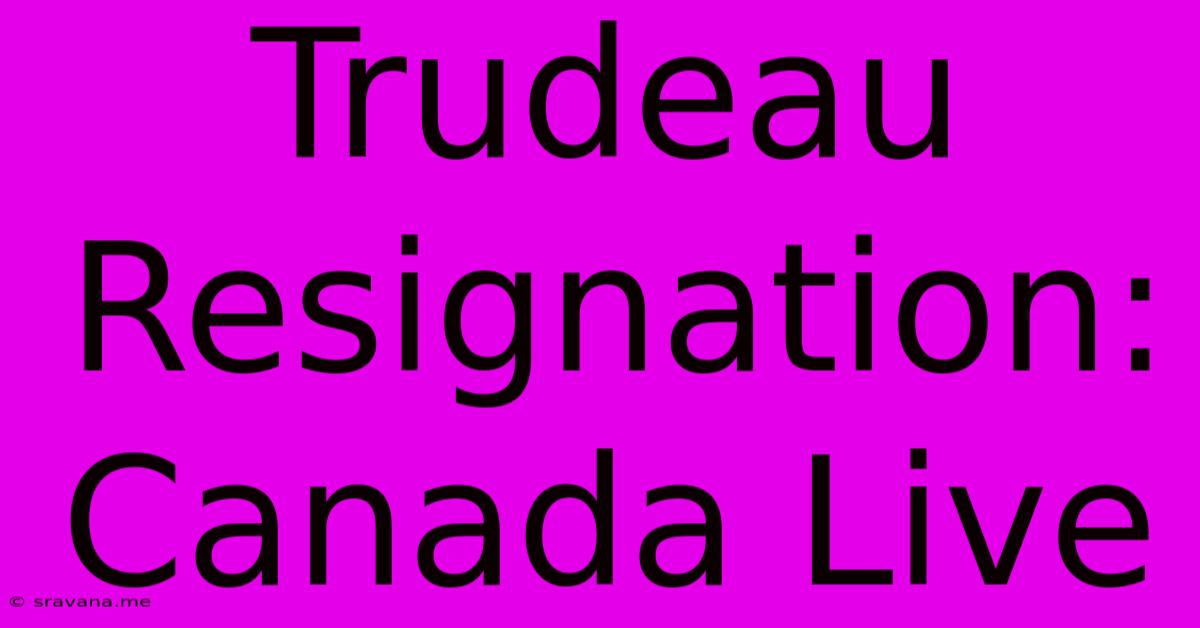Trudeau Resignation: Canada Live

Discover more detailed and exciting information on our website. Click the link below to start your adventure: Visit Best Website sravana.me. Don't miss out!
Table of Contents
Trudeau Resignation: Canada Live – Speculation, Impact, and the Future
The possibility of Prime Minister Justin Trudeau's resignation has repeatedly surfaced in Canadian media, sparking intense speculation and analysis. While no official announcement has been made as of this writing, examining the potential scenarios, their impact on Canada, and the potential successors is crucial for understanding the current political landscape. This article delves deep into the "Trudeau Resignation: Canada Live" narrative, exploring its various facets.
The Whispers of Resignation: Why the Speculation?
Several factors contribute to the ongoing speculation surrounding a potential Trudeau resignation. These include:
1. Length of Time in Office:</h3>
Trudeau's tenure as Prime Minister has been significant. The sheer length of time in power often leads to calls for a change, a natural ebb and flow in democratic systems. Fatigue amongst both the public and within the Liberal Party itself might play a role. The pressure to step aside and allow for fresh leadership is a recurring theme in long-term premierships.
2. Recent Electoral Performance:</h3>
While the Liberals remain a major force in Canadian politics, their electoral performance in recent years hasn't been overwhelmingly decisive. Minorities governments require constant negotiation and compromise, potentially leading to feelings of political gridlock and a desire for a new approach. This wavering performance fuels the narrative of a leadership change.
3. Scandals and Controversies:</h3>
Throughout Trudeau's time in office, several controversies have emerged, ranging from accusations of political interference to ethical dilemmas concerning the handling of government funds. While investigations may have cleared Trudeau in some instances, the negative publicity and erosion of public trust can create an atmosphere ripe for calls for a resignation. These incidents become fuel for the ongoing speculation.
4. Internal Party Dynamics:</h3>
The inner workings of the Liberal Party are not always transparent. Rumours of internal disagreements, factionalism, and jockeying for power amongst potential successors contribute significantly to the speculation. These whispers within the party can leak into the public sphere, intensifying the “Trudeau Resignation” narrative.
The Potential Impact of a Trudeau Resignation
A Trudeau resignation would undoubtedly have significant repercussions across the Canadian political landscape:
1. Leadership Transition:</h3>
The process of selecting a new Liberal Party leader and Prime Minister would be a period of intense political activity. A leadership race would likely involve several prominent figures within the party, each vying for the support of party members and the public. The outcome would dramatically shape the future direction of the Liberal Party and the government.
2. Economic Uncertainty:</h3>
Political transitions can create economic uncertainty. Depending on the policies and priorities of the new leader, there might be shifts in economic policy, impacting investment, trade, and overall economic growth. The markets could react negatively until a clear leadership picture emerges.
3. Social Policy Shifts:</h3>
The new leader's approach to social issues could significantly differ from Trudeau's. Changes in policy on healthcare, climate change, social justice, and other key areas are possible, depending on the political ideology of the incoming Prime Minister. This uncertainty can lead to both anticipation and concern within various segments of the Canadian population.
4. International Relations:</h3>
Canada's relationship with other countries could also be impacted. A new leader may bring different perspectives and priorities to international diplomacy, influencing alliances and foreign policy strategies. The stability and predictability of Canada's international standing could be temporarily affected.
5. Potential for Snap Election:</h3>
Depending on the circumstances surrounding the resignation, a snap federal election could be triggered. This would plunge the country into another election cycle, with its own set of costs and uncertainties. This is a high-stakes event that could drastically reshape the political balance of power in Canada.
Potential Successors and Their Platforms:
Several prominent Liberal Party members could potentially succeed Trudeau. Analyzing their past statements and political stances gives insights into the potential future direction of the party:
(Note: This section would list and briefly describe several potential successors and their platforms. Due to the rapidly changing political landscape, providing specific details would risk inaccuracy. The focus should be on illustrating the process of identifying and examining potential candidates, rather than offering definitive predictions.)
The Future of Canadian Politics:
Regardless of the timing of a potential Trudeau resignation, Canadian politics is poised for a period of significant change and uncertainty. The nation will face pivotal decisions regarding economic strategy, social programs, and international relations. The public's role in this transitional period is vital. Engaging in informed discussions, participating in political processes, and holding elected officials accountable are essential for ensuring a stable and prosperous future for Canada.
Conclusion:
The "Trudeau Resignation: Canada Live" narrative underscores the dynamic and ever-evolving nature of Canadian politics. While speculation swirls, careful analysis of potential scenarios, the implications for the country, and the possible successors allows for a more informed understanding of the current climate. It's a time of significant political transition, and the actions and choices of all stakeholders, including the electorate, will play a decisive role in shaping Canada's future. Stay informed, stay engaged, and participate actively in shaping the political landscape of this pivotal moment in Canadian history.

Thank you for visiting our website wich cover about Trudeau Resignation: Canada Live. We hope the information provided has been useful to you. Feel free to contact us if you have any questions or need further assistance. See you next time and dont miss to bookmark.
Also read the following articles
| Article Title | Date |
|---|---|
| Nottingham Forest 3 0 Wolves Live Reaction | Jan 08, 2025 |
| Photo Gallery Wolves Vs Nottingham | Jan 08, 2025 |
| Trudeau Resignation Days Away | Jan 08, 2025 |
| Minera Vs Real Madrid 5 0 Scoreline Analyzed | Jan 08, 2025 |
| Betting Odds Minnesota Vikings Vs Rams | Jan 08, 2025 |
